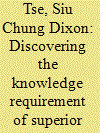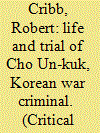|
|
|
Sort Order |
|
|
|
Items / Page
|
|
|
|
|
|
|
| Srl | Item |
| 1 |
ID:
148778


|
|
|
|
|
| Summary/Abstract |
This article attempts to discover and rationalize the inconsistent application of the mens rea requirement of superior responsibility in the war crimes trials in Hong Kong from 1946-1948. A mixed methodology is adopted, involving statistical analysis of sentencing outcomes in the 46 trials involving 123 accused persons, black-letter analysis, and case study. It will be suggested that the standard of knowledge pleaded by the prosecution in each “case-type” had a bearing in the sentencing process: (i) “Yamashita knowledge” in “invasion cases” attracted lenient sentences; (ii) “constructive knowledge” in “POW camp cases” entailed a higher degree of culpability; and (iii) “actual knowledge” in “Kempeitai cases” led to the severest penalties. This provides the evidence that although mens rea was not an essential element of superior responsibility, it was nevertheless an important sentencing factor.
|
|
|
|
|
|
|
|
|
|
|
|
|
|
|
|
| 2 |
ID:
151105


|
|
|
|
|
| Summary/Abstract |
The post-World War II Australian military war crimes trials of Japanese from 1945–51 have been criticised for using a rule of evidence considerably relaxed from the ordinary requirements of a criminal trial, one that did not require witnesses to give evidence in person. Circumstantial evidence suggests that, in relation to a trial held in Darwin in March 1946 for war crimes committed in Timor, the secretive Special Operations Australia, otherwise known as the Services Reconnaissance Department (SRD), took advantage of the rule. This article argues that the SRD did not allow their members to give evidence in person in an attempt to control and limit the dissemination of information about their operational and security failures in Timor from 1943–45. The SRD operation was adjudged by its own official historian as displaying ‘gross inefficiency and criminal negligence’. While the SRD’s failures were known to select personnel at the time, access restrictions to archival records in the post-war period, including the war crimes trials, meant that the extent of its failures and how it appeared to manage knowledge of them has not been widely known.
|
|
|
|
|
|
|
|
|
|
|
|
|
|
|
|
| 3 |
ID:
160926


|
|
|
|
|
| Summary/Abstract |
In 1946, a British military court in Singapore tried a Korean national named Cho Un-kuk for war crimes against Allied prisoners of war on the Thailand–Burma Railway during the Second World War. The evidence against Cho was scanty, but he had been part of a group of Korean guards notorious for brutality towards prisoners. In expedited proceedings relying heavily on affidavit material, Cho was found guilty and sentenced to fifteen years in prison. The trial revealed both Cho’s unexpected transnational background as a dentist in pre-war British India and the complex position of Korean guards on the Railway. Often characterized as universally brutal as a result of their own ill-treatment by the Japanese colonial system, the guards responded in many different ways to the pressures and opportunities of service subordinate to the Japanese military. After sentencing, Cho served time in Singapore and Japan. He left prison a broken man in 1955. Like other Koreans who had been in Japanese military employment, he was spurned by other Koreans as a collaborator. Only in 2006, after his death, was he officially recognized as an unwilling conscript into Japanese service. His case illustrates the difficulty of distinguishing victims and perpetrators in the tangled circumstances of the Second World War.
|
|
|
|
|
|
|
|
|
|
|
|
|
|
|
|
| 4 |
ID:
151762


|
|
|
|
|
| Summary/Abstract |
An enduring dilemma in war is whether and how to punish those responsible for war crimes. In this essay, we analyze the most frequent criticisms made by war crimes trial skeptics, including the claims that such trials endanger prospects for peace by encouraging enemies to continue fighting, that they achieve only “victors’ justice” rather than real justice, and that, in any event, they are unnecessary due to the existence of more effective and less costly alternatives. We conclude, in accordance with a “moderate retributivism,” that when carried out consistently with established law and procedure, and when not dramatically outweighed by concerns that trials will exacerbate ongoing or future conflicts, prosecutions are a legitimate, and sometimes necessary, response to violations of the laws of war and international criminal law more broadly.
|
|
|
|
|
|
|
|
|
|
|
|
|
|
|
|
|
|
|
|
|